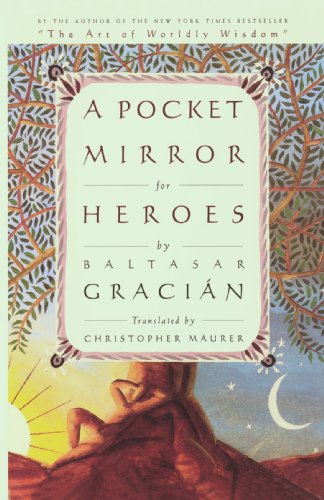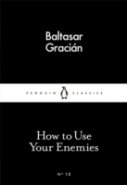Background
He was born in 1601 into a religious family in Belmonte, Zaragoza, Aragon, Spain, son of a doctor. In his childhood Gracián lived with his uncle, who was a priest.



(A Pocket Mirror for Heroes is a mirror because it reflect...)
A Pocket Mirror for Heroes is a mirror because it reflects "the person you are or the one you ought to be." It is a pocket mirror because its author took the time to be brief. And it is a mirror for heroes because it provides a vivid image of ethical and moral perfection to which all can aspire. The Art of Worldly Wisdom by Baltasar Gracian was all but forgotten for three hundred years, until its republication in 1992 turned this lost classic into a New York Times bestseller. Now Gracian, the Spanish Jesuit considered Machiavelli's better in strategy and insight, sets a new standard on the art of living and the practice of achieving. That new standard is the art of heroism--how to be "the consummate person, ripe and perfect: accurate in judgment, mature in taste, attentive in listening, wise in sayings, shrewd in deeds, the center of all perfection." Gracian teaches the reader to be "a giant"--"the greatest person possible, a miracle of perfection, a king." Wit, wisdom, courage, elegance, grace, humility, spontaneity--these are the qualities needed to reach heroism in any occupation. But it is not enough to be wise or graceful: one must learn as well how to manage that talent, how to distinguish a quality fiom its shadow. A Pocket Mirror for Heroes provides "a politics for governing oneself, a compass for sailing toward excellence, an art for reaching distinction with just a few rules of discretion," and it will be wise and witty company for anyone who recognizes--and relishes--the challenges of daily life. From the Hardcover edition.
http://www.amazon.com/gp/product/0385503148/?tag=2022091-20

(Better mad with the crowd than sane all aloneIn these wit...)
Better mad with the crowd than sane all aloneIn these witty Machiavellian aphorisms unlikely Spanish priest Baltasar Gracian shows us how to exploit friends and enemies alike to thrive in a world of deception and illusion Introducing Little Black Classics 80 books for Penguins 80th birthday Little Black Classics celebrate the huge range and diversity of Penguin Classics with books from around the world and across many centuries They take us from a balloon ride over Victorian London to a garden of blossom in Japan from Tierra del Fuego to 16thcentury California and the Russian steppe Here are stories lyrical and savage poems epic and intimate essays satirical and inspirational and ideas that have shaped the lives of millions
http://www.amazon.com/gp/product/B01BITMTNW/?tag=2022091-20
He was born in 1601 into a religious family in Belmonte, Zaragoza, Aragon, Spain, son of a doctor. In his childhood Gracián lived with his uncle, who was a priest.
Baltasar Gracián was sent at 12 to study in the medieval atmosphere of Toledo. At 18 he entered the Society of Jesus and was sent to Saragossa and later to Valencia to study theology.
Soon after his ordination as a Jesuit in 1635, he met Juan de Lastanosa, who provided Gracián and several of his creative contemporaries a home and financial support affording unlimited leisure for peripatetic conversation and meditation, as well as a means to publication. After holding several pastorates, Gracián served as field chaplain to the Spanish army under Gen. Pablo Parada.
Later, while professor of religion at Saragossa, he published without the permission of his order a philosophical novel, El criticón, for whose cynical and pessimistic tone he received a reprimand from Goswin Nickel, the superior of the Jesuits. When Gracián published two other books under pseudonyms, Nickel ordered an official investigation of his defiance of Jesuit authority. As a result, Gracián was watched, his quarters were searched regularly, and no ink, pen, or paper was permitted him. Under this humiliation, Gracián petitioned for permission to resign from the order, a petition not only denied but punished by denying him his pulpit. Silenced, disgraced, and embittered, Gracián withdrew in poor health to Tarazona, where he died on Dec. 6, 1658.
Gracián wrote five works important in the history of Spanish thought, of which El héroe (1637; The Hero), El discreto (1646; The Discreet Person), and El criticón (1651 - 1657; The Critic) stand out. In The Hero Gracián characterized qualities essential to leadership: wit, charm, discretion, and especially vigilance against fools. Gracián's hero is a unique person who succeeds by integrity, discretion, linguistic gifts, and above all by shrewd political achievements. He is the product of a mind steeped in the classic Italian publications on political philosophy. In The Discreet Person Gracián presents his friend and patron, Lastanosa, as a model leader of men.
Gracián's most ambitious book, The Critic, is a kind of Spanish Pilgrim's Progress in that both are allegorical stories with a moral purpose. The work's lengthy and complex plot provides a broad and pessimistic allegorical vision of human life. The story revolves around two characters, Andrenio and Critilo, symbols of nature and civilization. They meet when the learned Critilo is shipwrecked on Saint Elena, where he finds Andrenio, a man untouched by civilization, living in a cave, ignorant of his parentage and of any language. Critilo adopts Andrenio and teaches him to talk. After they are rescued from the island and taken to Spain, they remain friends and share many adventures. When Andrenio is victimized by the deceitful Falsirena in Madrid, Critilo looses a diatribe against all mankind, concluding that "Men are bad, women worse. " As Gracián mixes reality with allegory, the two travel in Spain, France, Germany, and Italy. In the principal square of an imaginary city, they find not men but lions, tigers, dragons, wolves, bulls, and panthers. In this land the rich are regaled with presents while the poor are neglected and the wise held in contempt. The two pilgrims see a judge sentence a mosquito to be hanged and quartered, while exonerating a criminal elephant. They go from the spring of youth, through the middle age of maturity, into old age, traveling via fanciful courts and palaces, plazas of illusion, squares of hypocrisy, and mansions of integrity, until finally they glimpse the wheel of time and death and the island of immortality, where they hope to find rest from their journeying. Rather than a novel in the 20th-century sense, The Critic is a vehicle employed by one of the most brilliant minds of 17th-century Spain to interpret the universe as he observed it.
In order to collect and anthologize his innermost thoughts, Gracián thoroughly combed his own works published before 1647 to compile Oráculo manual y arte de prudencia (The Art of Worldly Wisdom). This book is one of the great modern collections of maxims.
He is classed with the greatest prose masters of Spain's Golden Age. Gracián's reputation as a baroque writer arises mainly from his Agudeza y arte de ingenio (Mental Alertness and Ingenuity as an Art), in which he characteristically followed such baroque form patterns as use of neologisms, antitheses, parallelisms, inversions, epithets, obscure metaphors, and ellipses. His writings were lauded by Schopenhauer and Nietzsche.
The Aragonese village where he was born, Belmonte de Calatayud, changed its name to Belmonte de Gracián in his honour.
(Better mad with the crowd than sane all aloneIn these wit...)
(A Pocket Mirror for Heroes is a mirror because it reflect...)
(Rare book)
A leader, he says, must close his ears to the common people or lose them, for they respect not the leader whose ways they believe they fathom.
Quotations: He says, "Every success is due three-quarters to luck, one-fifth to sweat, only one-twentieth to ability. "
